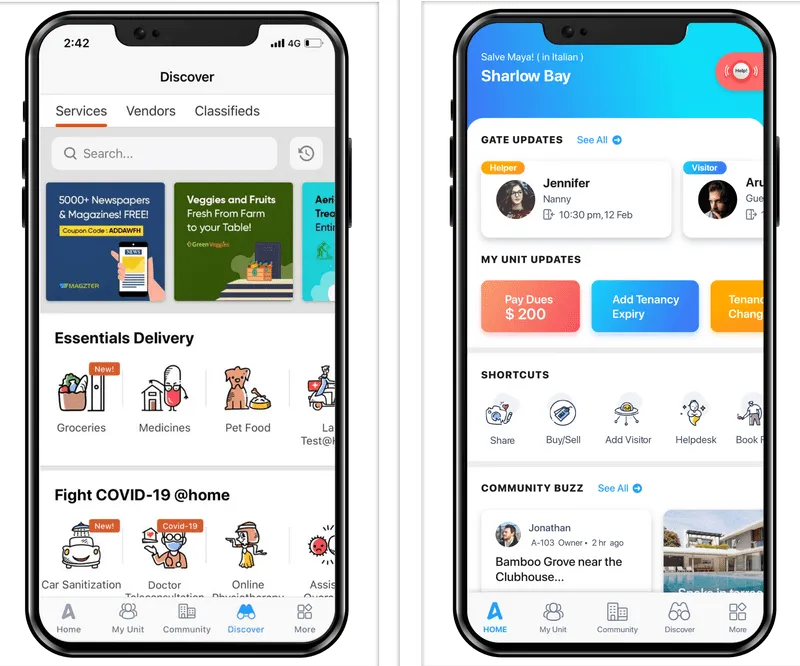This apartment management startup is connecting local vendors, residents amid coronavirus lockdown
Bengaluru-based apartment management startup ADDA has opened up its services marketplace Discover to let vendors and residents transact for essential services. Here’s how.
Since the coronavirus lockdown began in India, gated communities and independent apartment complexes have undergone a sea change.
From the shutting of common areas like gyms, parks, and clubhouses to the complete ban on visitors, including milkmen, delivery executives, and domestic helps, residential societies are in the middle of a mobility crunch.
Due to their restricted access to vendors and delivery personnel, the biggest challenge for housing societies right now is the supply of essential items like groceries, medicines, and emergency services like lab tests, pet care, etc.
Apartment security startup ADDA has come up with a fix for these issues.

San Banerjee, Founder and CEO, ADDA
San Banerjee, Founder and CEO, ADDA, tells ,
“Even before the lockdown began, some major shifts were being seen in apartment complexes. More people were home, and management committees suddenly had a lot of responsibilities. Many gated communities even had international travellers, which meant there were more quarantined homes. Some volunteer groups were formed for the delivery of essentials, but with gates completely closed for visitors; that became a problem too.”
To overcome this, ADDA has opened up its apartment service marketplace ‘Discover’ to connect local vendors with residents.
The platform was originally meant for subscribers of ADDA (more on that later). Now, after the lockdown, it can be accessed by all residents for free.
With ADDA Discover, residents can procure essential items easily, and vendors can resume their businesses and start generating some much-needed cash flow. The startup is also ensuring that vendors follow contactless deliveries.
With the lockdown extended for two more weeks, this is ADDA’s attempt to streamline apartment logistics, particularly in COVID-19 hotspots or red zones.
How Discover works for residents
The Bengaluru-based startup is supporting the Karnataka government’s initiative to bring 16,000+ local grocery and medical stores online.
Delivery helpline numbers can be accessed by residents through the ADDA app. Users receive app notifications when the vendor leaves their parcels at the apartment gate.
Vendors can list their services and offers on the platform, and tailor them based on the needs of customers. Residents can select the category of service they want and choose a suitable vendor from the list. The vendor charges residents directly based on the services availed.
The founder shares,
“A deluge of vendors started approaching us to service micro areas. Some even wanted to cater to single societies and buildings for services like home tests, pet food, medicines, and grocery deliveries. Hyperlocal service availability is the need of the hour to maintain lockdown restrictions.”

In Bengaluru, ADDA has partnered with brands like , GreenVeggies, and others for delivery of groceries, fresh fruits, and vegetables. There is for elderly care, and Tailslife for pet food deliveries. In Chennai, it has on-boarded myHarvest Farms for the delivery of fresh harvest directly from farms to homes.
Discover users can also avail medicine deliveries, pathology tests, community sanitisation, fumigation services, pest control, and so on from providers like , , ZevA, Bangalore Pest Control, Vijay Home Services, and others.
Discover has on boarded more than 60 new vendors in Bengaluru within a month. The availability of services on the platform is based on pincodes. If a vendor does not service a particular pincode, they will not be visible to residents of that area.

The founder explains,
“This is to ensure there aren’t service cancellation requests and other confusions due to the non-availability of any vendor partner. Most of our partner vendors are recommended by neighbours; hence the quality of service is guaranteed.”
Discover is not a revenue-generating product yet. But once it reaches scale, ADDA plans to charge vendors for banner ads and for pushing their services on the app.
The marketplace is live in Bengaluru, Chennai, Mumbai, and Pune, and will roll out in Hyderabad, Delhi-NCR, Kolkata, and more cities soon.
ADDA operations and roadmap
ADDA is one of the oldest players in the rapidly-growing residential security and management sector in India. It was founded in 2009 on the premise that a gated community is also a registered organisation, and hence, needs formal processes.
The startup has built a centralised platform for residential complexes to manage multiple databases involving owners, tenants, associations, vehicles, staff, assets, vendors, visitors, clubs, associations, security, etc. ADDA is being used in over 2,000 gated communities across 80 cities in India.
San says, “A lot more apartment complexes are now sensitised to the need for a centralised management platform for efficient functioning. After the coronavirus outbreak, over 30 percent of residential societies have converted to online billing.”

ADDA offers two subscription-driven products: ADDA Gatekeeper, which is an app-based visitor management system; and ADDA ERP, a SaaS-based solution for managing society documents, event calendars, parking lots, staff attendance, facility booking, notice boards, messaging, rent collection, payment reminders, and more.
Without revealing numbers, ADDA claims that the business has recorded a 30-40 percent revenue growth in the last two years. A lot of societies in Tier II cities like Kochi, Coimbatore, Bhubaneshwar, etc., are now coming on to the platform.
ADDA competes with platforms like , JioGate, NoBrokerHOOD, Smart Guard (by CommonFloor), SocietyRun, AZore, and others.
It has been bootstrapped for a decade because “our focus shifted to revenues and profitability” from user growth, according to the founder. “Investors come with different interests. We didn’t want to be entirely dependent on them,” she says.
ADDA is looking to raise funds and is in talks with VCs. San believes that the residential software market will move towards increased automation in future.
“The sector will shift from heavy dependence on security guards to automated gate management systems in five to ten years. A lot of people will opt for contactless entries. What is happening now is just the beginning,” she says.
Edited by Megha Reddy











